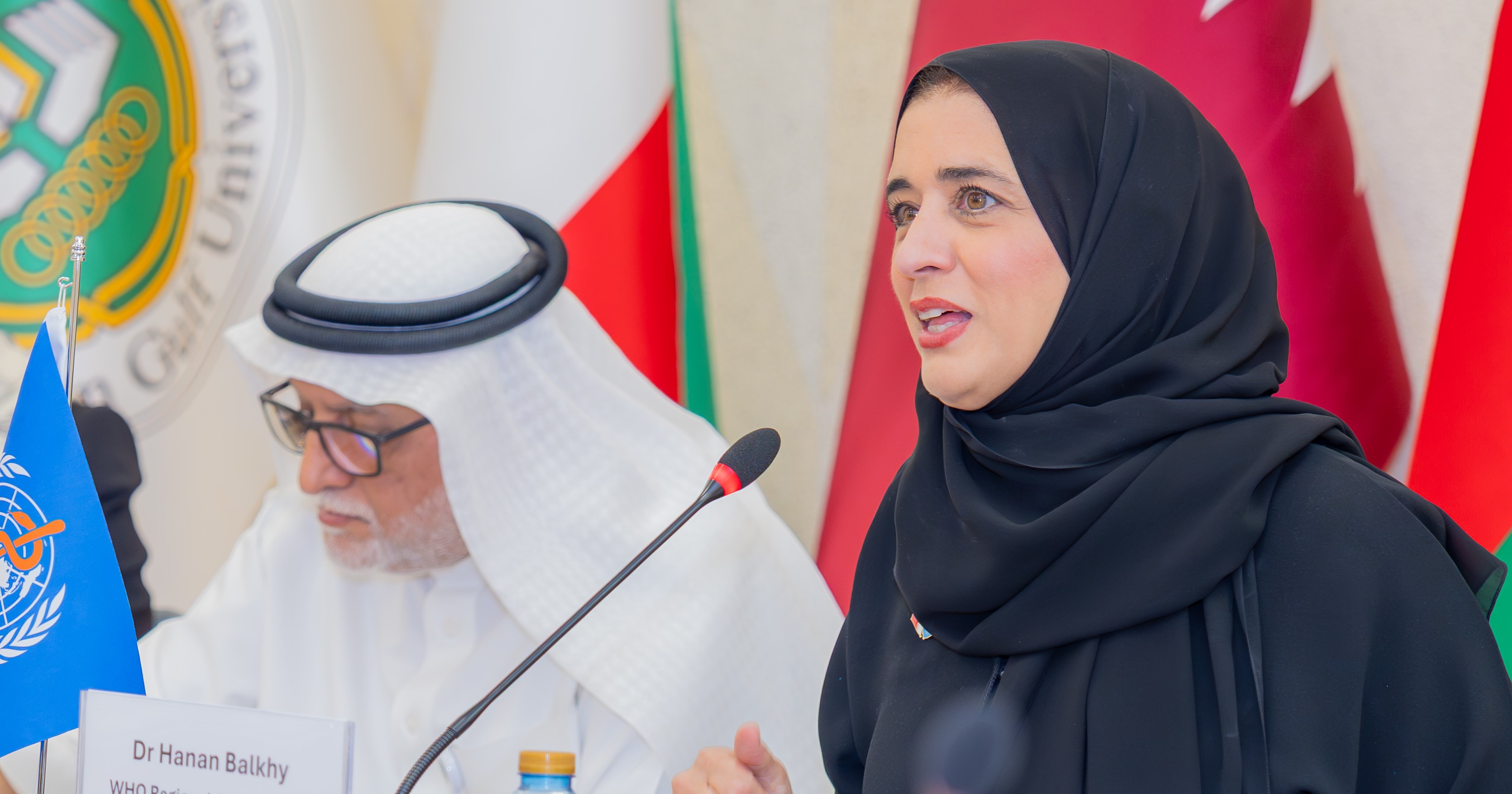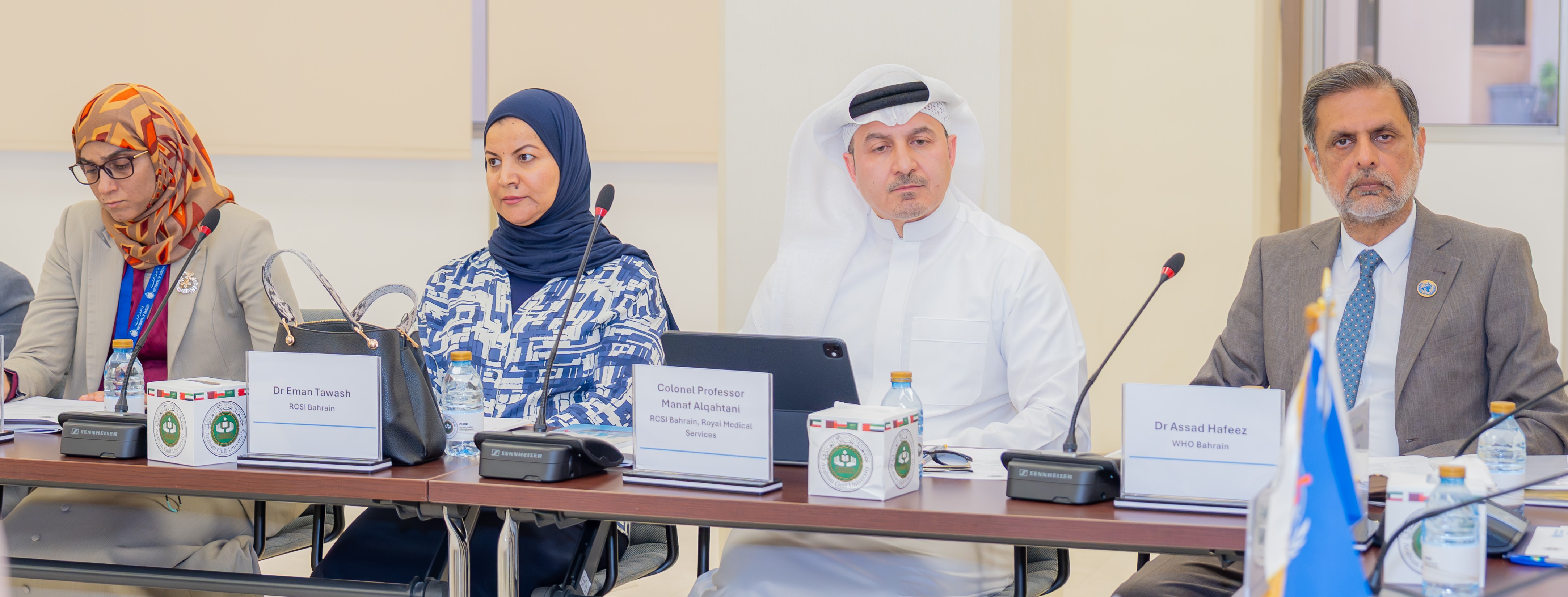
AGU Hosts Roundtable to Discuss Training of Health Workforce on Combating Antimicrobial Resistance
Arabian Gulf University
06 Aug, 2025
The Arabian Gulf University (AGU) hosted a roundtable discussion on the education and training of health workers regarding Antimicrobial Resistance (AMR), attended by Dr Hanan Balkhy, the World Health Organisation (WHO) Regional Director for the Eastern Mediterranean. The event saw the participation of prominent physicians, academics, health practitioners, and policymakers from various national, regional, and international institutions.
At the opening of the roundtable, moderated by Dr Assad Hafeez, Acting WHO Representative in the Kingdom of Bahrain, Dr Abdulrahman Yousif Ismaeel, AGU Vice President for Support Services and Institutional Affairs, affirmed the University's commitment to its regional mission of advancing health education and strengthening health systems in the GCC and brotherly countries in the region.

He welcomed the WHO Regional Director for the Eastern Mediterranean, as well as Dr Lulwa Rashid Showaiter, Undersecretary of the Ministry of Health, and Dr Jameela Al Salman, Shura Council member and Chairperson of the Strategic and Technical Advisory Group for Antimicrobial Resistance.
He also praised the participation of representatives from the Bahraini Ministry of Health, health and professional bodies, academics, and health practitioners, alongside the University's partners from national, regional, and international health institutions.
"The goal that brings the participating parties together is integration in facing common challenges and building stronger, more responsive educational and health systems," he explained, praising the efforts of the WHO office in the Kingdom of Bahrain for their effective strategic partnership and continuous support in strengthening Bahrain's health system, and their collaboration with AGU to implement the activities of the WHO Collaborating Centre for Health Professions Education Development.

He stressed AGU's commitment, through its academic programmes in medicine, nursing, postgraduate studies, professional training, and clinical simulation, to preparing a health workforce capable of deeply understanding the challenges of antimicrobial resistance and qualified to deal with them efficiently and with a robust community response.
He pointed out that the University and its partners are proceeding to activate tools such as the Competency Framework for Health Workers’ Education and Training on Antimicrobial Resistance, and are committed to the curriculum evaluation guide recently launched by the WHO.
"At the same time, the University is actively contributing to accelerating progress in implementing the Strategic Operational Plan for the Eastern Mediterranean Region 2025–2028 and achieving the health-related Sustainable Development Goals," he stressed.
For her part, Dr Balkhy underscored the danger of antimicrobial resistance to public health in the Eastern Mediterranean Region, which has become a growing threat, causing the death of more than 96,000 people in 2021, a third of whom were children under the age of five.
"We need a collective response that enhances surveillance systems, limits the irrational use of antibiotics, and invests in training the health workforce," she said, stressing the WHO's commitment to supporting countries through national action plans and the One Health approach to ensure a safer health future.

In turn, Dr Showaiter affirmed that Bahrain gives antimicrobial resistance top priority through a comprehensive national plan that adopts the One Health approach to enhance collaboration between the health, veterinary, and environmental sectors.
She explained that the national committee concerned with this approach is working to develop strategies and coordinate efforts to face health challenges, including antimicrobial resistance, in collaboration with local and international partners.
She also noted that the Kingdom has updated its national plan according to global standards, with a focus on surveillance, diagnosis, training of the workforce, and regulating the prescription and dispensing of antibiotics, stressing the importance of regional and international partnerships, especially with the WHO and AِGU, in supporting national efforts.
In the same context, Professor Abdelhalim Deifalla, Dean of the College of Medicine and Health Sciences of AGU, explained that this vital discussion on education related to antimicrobial resistance highlights the importance of addressing the most prominent health challenges of our time. He added, "At AGU, we are working to develop curricula to ensure the graduation of a health workforce capable not only of providing care but also of protecting the effectiveness of antibiotics and strengthening health systems."
He also praised the efforts of the WHO Regional Office for the Eastern Mediterranean and the WHO office in Bahrain for organising this meeting and prioritising this important issue.

Furthermore, the main speakers at the roundtable—including Dr Al Salman; Dr Adel Al Sayyad, Epidemiology and Public Health Consultant and Chief of the Disease Control Section at the Public Health Directorate of the Ministry of Health; and Lieutenant Colonel Dr Manaf Al Qahtani, Infectious Disease Consultant at the BDF Hospital—discussed the most significant challenges and priorities related to antimicrobial resistance in Bahrain and the Eastern Mediterranean Region.
The discussion participants stressed the pivotal role of health education and training in confronting this crisis. They also reviewed several recommendations from the regional meeting on AMR programmes, which focused on integrating key concepts into educational curricula, building capacity, and developing national research agendas.
